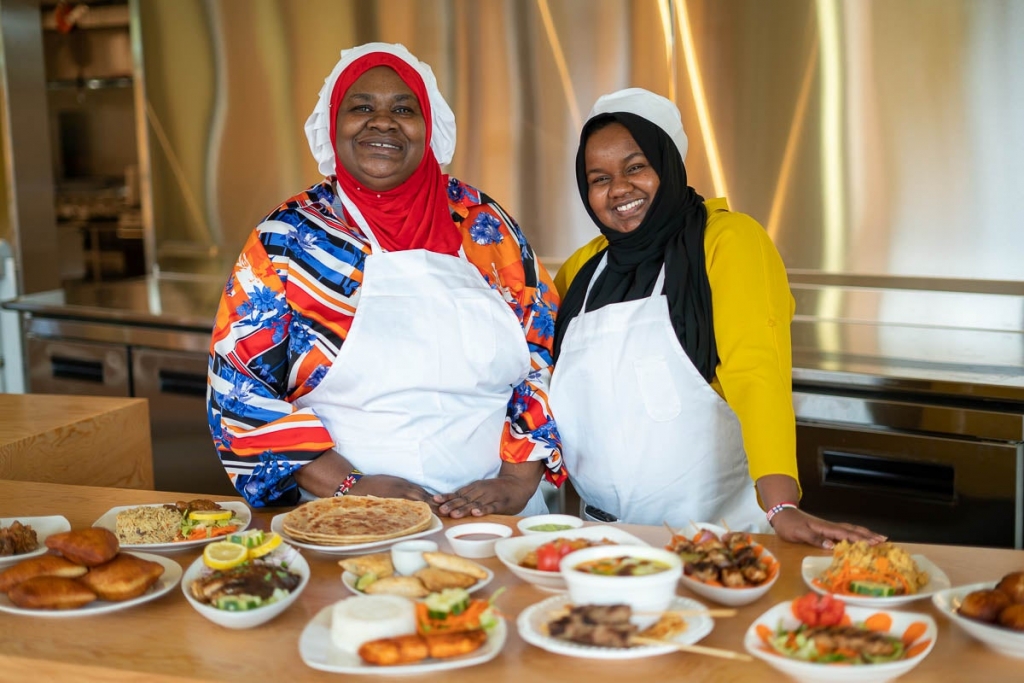
As we continue to celebrate Black History Month, we wanted to uplift Black immigrant owned businesses who continue to make history for future generations. These first-generation American business owners have moved to the Greater Seattle Area from all over the world and continue to delight their communities with their immense passion, expertise, and culinary talent.
With this list of 10 Black immigrant-owned businesses, we’re just scratching the surface of Black immigrant owned businesses in the Greater Seattle Area — so be sure to leave your top recommendations in the comments below!
THE CARIBBEAN
Taste of the Caribbean, owned by Dwayne Blake and Carlene Comrie
Central District
At their restaurant, Taste of the Caribbean, Dwayne Blake and Carlene Comrie make Fridays feel like a day at the beach with their monthly fish fries. Their true-to-Jamaica restaurant offers home-cooked, delicious Caribbean foods such as oxtail, jerk chicken, curried goat, and fried plantains.
ETHIOPIA
Amy’s Merkato, owned by Filli Abdulkadir and Yodit Seyoum
Hillman City
Amy’s Merkato first debuted as an Ethiopian restaurant in 1992. In 2000, Filli Abdulkadir and Yodit Seyoum took over when Amy returned to Ethiopia. Today, the restaurant serves traditional Ethiopian and Eritrean food as well as a variety of breakfast and lunch options. Amy’s Merkato also sells a curated variety of spices, coffee, and kitchenware imported from Addis Ababa.
THE GAMBIA
Bantaba African Restaurant, owned by Abdoulie Lowe
Lynnwood
If you’ve never tried West African food, what are you waiting for? At Bantaba African Restaurant, you can try a variety of traditional recipes including afra grilled lamb, deep-fried fish, and crispy crusted meat pie. West African food is known for its spicy kick and perfectly cooked meats. Immigrants from the West African region vouch that the restaurant is perfectly authentic. Owner Abdoulie Lowe is the heart of the restaurant, and he opened the popular spot to share his favorite foods with the community in 2013. Pro tip: This fast casual restaurant is a counter-serve spot, but be prepared to wait for made-to-order piping hot food!
HONDURAS
Mi Bella Honduras, owned by Wendy Sauzo
Federal Way
If you’ve dreamt of being a restaurant regular where the owner will know your name, Mi Bella Honduras is your spot. Owner Wendy Sauzo immigrated to New York at 16 with her family, where she would eventually open her own food cart. The overwhelming popularity of her delicious papusas and baleadas confirmed her food would be a success wherever she went. Today, you’ll find Wendy in Federal Way serving up her phenomenal food and attentive charm, always with a side of tostones (plantains)!
KENYA
Safari Njema, owned by Jane Kagira, George Murigo and John Mbogo
Columbia City, Seattle
Originally from Kenya, chef Jane Kagira immigrated to the United States in the mid 1990s. She and her husband George Murigo (along with her brother in law, John Mbogo) own Safari Njema Restaurant, where they serve hearty portions of Kenyan food in an informal setting.
SENEGAL
Touba Bakery, owned by Papa Seck
Everett
From the moment you walk in the door, the wafting scent of freshly baked treats lets you know you’ve definitely come to the right place. Despite opening during a pandemic in 2020, Touba Bakery owner, Papa Seck has already made a delicious impression on the Everett community. Originally from Senegal, he has baked all his life, and developed a special passion for French pastry. Customers love the delicious array of sweet and savory croissant, brioche, caneles de Bordeaux, pain au chocolat, baguette, and more. Fun Fact: Papa named his business after the city of Touba in Senegal.
SOMALIA
Juba Restaurant and Cafe, owned by Abshir Warsame and Abdiqafar Wagafe
Tukwila
If you ask the regulars at Juba Restaurant & Café, they’ll tell you that your first dish at the popular spot ought to be their chicken suqaar. The neighborhood restaurant opened in 2011, and is owned by Abshir Warsame and Abdiqafar Wagafe. Visitors love the cozy, right-at-home ambiance, and the array of menu options that highlight East African and Middle Eastern cuisine. Pro tip: This restaurant is close to the airport and offers a tasty, satiating meal option before a day of travel!
TANZANIA (AND KENYA)
Moyo Kitchen, owned by Mwana Moyo and Batulo Nuh
Tukwila
Mwana Moyo is originally from Tanzania and Batulo Nuh is originally from Kenya. They began their business partnership as neighbors who spoke the same language. Moyo Kitchen blends the flavors and foods of their countries of origin, including sambusas, Samaki wa Kupaka (fish with coconut sauce), and other East African dishes. The restaurant opened in September 2020 as part of the Food Innovation Network’s Spice Bridge food hall. Fun fact: Moyo means heart in Swahili.
TRINIDAD
Pam’s Kitchen, owned by Pam Jacob
Wallingford
Originally from Trinidad, Pam Jacob moved to Seattle in the mid-1990s, and dreamed of opening her own restaurant. She began catering events for her housecleaning clients, and before she knew it she had opened Pam’s Kitchen, where she serves her outstanding Trinidadian food.
ZAMBIA
Rabecca Onassis Boutique, owned by Frilancy Hoyle
Belltown, Seattle
If you’re looking for a unique outfit for a special occasion, you’ll receive one-on-one styling and assistance from the team at Rabecca Onassis Boutique. The curated selection at this neighborhood boutique features feminine dresses, tops, bottoms, shoes, and more. Owner Frilancy Hoyle has had a dream of owning her own women’s clothing boutique since she moved to the United States from Zambia. Fun fact: The store is named after Frilancy’s grandmother!
Are we missing your favorite Black Immigrant owned businesses in Seattle? Suggest it here, and we’ll get it added!
Check our guides to Black-owned businesses in other cities like Los Angeles, San Diego, Oakland and East Bay and Portland.
2 responses to “An InTENtional List of Black Immigrant Owned Businesses in Seattle”